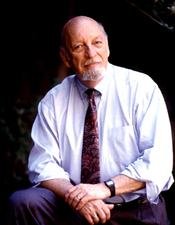
Share Your Memory of
Robert
Obituary of Robert Ader
Dr. Robert Ader
December 20, 2011 Survived by his wife of 54 years Gayle, daughters; Deborah (Willem), Janet, Rini, Leslie (Charles), Grandson; Benjamin Robert.
Dr. Ader was a distinguished Professor at the U of R where he served more than 50 years.
He is the father of the scientific field of psychoneuroimmunology.
Robert Ader, Founder of Psychoneuroimmunology, Dies
December 20, 2011
Robert Ader, Ph.D., a founder of the field of study that investigates links between the mind and the body’s immune system and a professor emeritus of Psychiatry at the University of Rochester Medical Center, died Dec. 20 at the Highlands at Pittsford. He was 79.
Dr. Ader coined the word psychoneuroimmunology to describe the field of study he helped create. He launched the journal Brain, Behavior and Immunity and was a Medical Center faculty member for 50 years.
He was the founder and past president of the Psychoneuroimmunology Research Society, and also past president of the Academy of Behavioral Medicine Research and the American Psychosomatic Society.
His theories that the human mind could significantly affect the ability of the immune system to fight disease initially were greeted with heated skepticism and sometimes scorn when he first proposed them more than 30 years ago, but now they are applied and studied in many medical specialties, not only psychiatry, by researchers around the world.
“Bob Ader and his colleagues transformed the way that we think about the relationship between life events and our environment, and how our bodies respond biologically,” said Eric Caine, M.D., chair of the Department of Psychiatry at the University of Rochester Medical Center. “His work has extraordinary implications, not only for understanding immunological responses to stress and disease, but also for appreciating the potentially powerful positive effects of what so many call the ‘placebo effect.’ ’’
In the early 1970s, in what would become one of his most distinctive experiments, Dr. Ader was studying taste aversion conditioning in rats. In the experiment, rats drank different volumes of a saccharin solution and also were injected with a dose of Cytoxan, an immunosuppressive drug that induces gastrointestinal upset. The rats “learned” or were conditioned to avoid consuming the solution.
When he stopped giving the rats the drug but continued to give them the saccharin solution, not only did the rats avoid drinking the solution, some of the animals died. The magnitude of the avoidance response of the rats was directly related to the volume of solution consumed, Dr. Ader found. He also found that the mortality rate also varied with the amount of solution consumed. Dr. Ader believed this orderly relationship could not be due to chance.
In a 2010 interview that appeared in the newsletter of the American Institute of Stress, Dr. Ader said: “As a psychologist, I was unaware that there were no connections between the brain and the immune system so I was free to consider any possibility that might explain this orderly relationship between the magnitude of the conditioned response and the rate of mortality. A hypothesis that seemed reasonable to me was that, in addition to conditioning the avoidance response, we were conditioning the immunosuppressive effects (of Cytoxan).”
This hypothesis was tested and confirmed in deliberately immunized animals; that classic study was published in 1975 in the journal Psychosomatic Medicine. Conditioning is learning and, as such, involves the higher centers of the brain. That study, clearly demonstrating that immune responses could be modified by classical conditioning, meant there were connections between the brain and the immune system and that the mind could have profound effects on the body’s functions that were thought to be independent.
“Your influence on the field is hard to overstate,” wrote Janice Kiecolt-Glaser, Ph.D., Distinguished University Professor at the Ohio State University Medical Center, in a collection of letters published in honor of Dr. Ader’s retirement earlier this year.
“The ideas that you championed in your early conditioning work were remarkably radical and heretical,” Kiecolt-Glaser wrote. “Now I tell my students about how your courage and vision were such an important force in helping shape the field so they can pursue their ideas today.”
In the collection of letters, more than 70 scientists from around the world praised Dr. Ader for his support and mentoring of numerous scientists, his leadership in the field and the scientific rigor of his research.
Nicholas Cohen, Ph.D., professor emeritus of Microbiology and Immunology at the Medical Center and a long-time collaborator with Dr. Ader, described Dr. Ader’s total aversion to taking shortcuts in developing an experiment’s protocol and the elegant and thorough design of his studies.
“The papers we wrote were airtight,” Cohen said.
After Dr. Ader and Cohen published an article in Science on the conditioned suppression of autoimmunity in mice, a noted immunologist told Cohen that he and his colleagues devoted a journal club to trying to poke holes in the paper. They were not successful and the immunologist stopped being a skeptic.
In 2009 in his most recent paper in the journal Psychosomatic Medicine, he and his fellow Medical Center researchers described using the placebo effect to successfully treat psoriasis patients with a quarter to a half of the usual dose of a widely used steroid medication. Early results in human patients suggest that this new technique could improve treatment for several chronic diseases that involve mental state or the immune system.
“Our study provides evidence that the placebo effect can make possible the treatment of psoriasis with an amount of drug that should be too small to work,” Dr. Ader said then. “While these results are preliminary, we believe the medical establishment needs to recognize the mind’s reaction to medication as a powerful part of many drug effects, and start taking advantage of it,”
In his 2010 interview for the American Institute for Stress, Dr. Ader said: “It seems to me that basic research on the interactions among behavior, neuroendocrine and immune processes has a bright future that promises new developments in our understanding of adaptive processes with profound consequences for the maintenance of health and for the treatment of disease.”
A native of the Bronx and a graduate of Tulane University, Dr. Ader received his Ph.D. at Cornell University. At the Medical Center, Dr. Ader rose through the ranks, becoming a professor of Psychiatry and Psychology in 1968. He held numerous titles during his tenure, including the George Engel Professor of Psychosocial Medicine and Distinguished University Professor. He retired in July as professor emeritus. He received an honorary doctor of science degree from Tulane and an honorary medical degree from Trondheim University in Norway.
In 2002, the Psychoneuroimmunology Research Society created an award, the Robert Ader New Investigator Award, to be given to promising young scientists.
Dr. Ader was editor and later co-editor of the book Psychoneuroimmunology, first published in 1981, that details the research supporting the proposition that the brain and immune system are an integrated system.
Dr. Ader is survived by his wife of 54 years, Gayle, four daughters and a grandson. Plans for a memorial service have not been announced.
Home
Pittsford, New York
Birthplace
New York, New York
Donations
Doctors Without Borders
USA Headquarters
333 7th Avenue, 2nd Floor
New York, NY 10001-5004
Link to Doctors Without Borders



